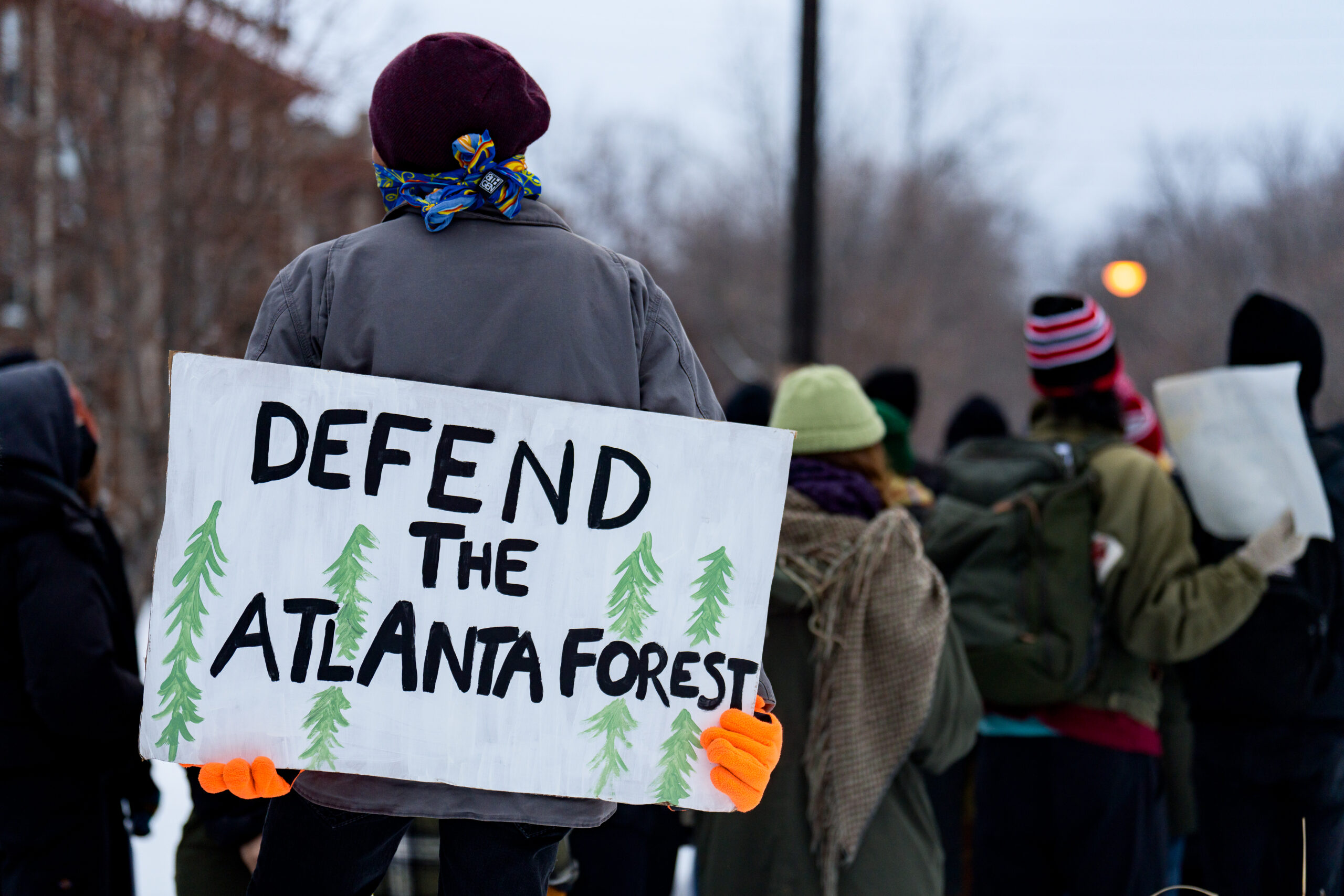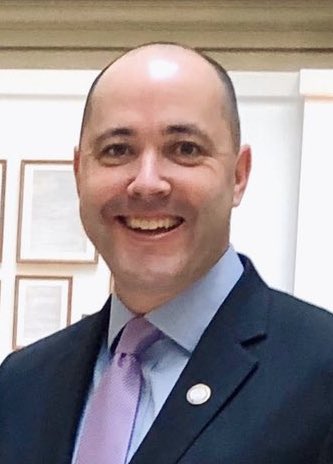consortiumnews.com/2023/12/04/georgia-frames-cop-city-protest-as-criminal-conspiracy/
and
~~ recommended by Existential Dread ~~
Georgia Frames Cop-City Protest as Criminal Conspiracy
Rachel McKane and David Pellow see Georgia’s RICO indictment as an attempt to repress social movement activity, using the state’s tools of legal interpretation and enforcement.

Protesters in January marching in Minneapolis in remembrance of Manuel Teran, who was shot and killed by officers at a prolonged protest in an Atlanta forest. They stopped at Lake/Girard where protester Deona Marie was killed on June 13, 2021. (Chad Davis, Wikimedia Commons,
By Rachel McKane and David Pellow
The Conversation


When does lawful protest become criminal activity? That question is at issue in Atlanta, where 57 people have been indicted and arraigned on racketeering charges for actions related to their protest against a planned police and firefighter training center that critics call “Cop City.”
Racketeering charges typically are reserved for people accused of conspiring toward a criminal goal, such as members of organized crime networks or financiers engaged in insider trading.
Georgia Attorney General Christopher Carr is attempting to build an argument that seeking to stop construction of the police training facility – through actions that include organizing protests, occupying the construction site and vandalizing police cars and construction equipment – constitutes a “corrupt agreement” or shared criminal goal.
As scholars who study environmental change and social justice, we believe the charges seek to suppress typical acts of civil disobedience. They also target grassroots community organizing models and ideas rooted in the practice of mutual aid – people organizing collective networks in order to meet each other’s basic needs.
The ‘Stop Cop City’ Movement
“Cop City,” officially known as the Atlanta Public Safety Training Center, was first proposed in 2017. The facility is expected to cost $90 million and is located on 85 acres of public land in the Weelaunee Forest, once home to the Indigenous Muscogee Creek peoples. The site is owned by the city of Atlanta but sits on unincorporated land in DeKalb County, just outside the city.
The opposition campaign has garnered support from activists and environmentalists who are concerned about militarization of police forces and potential threats to the Black community, as well as to climate resilience in Atlanta.
Members of Defend the Atlanta Forest, a decentralized movement of grassroots groups and individuals, argue that the threatened forest provides essential ecological services – filtering rainwater, preventing flooding, providing habitat for wildlife and cooling the city in a time of climate change.
Activists have led protest marches, written letters to elected officials and organized a referendum for the public to decide the future of the property. Some have camped out in the Welaunee Forest – a method that radical environmental defense groups like Earth First! have used to delay or prevent logging. In one instance, activists reportedly set construction equipment on fire.

Carr has filed a sweeping RICO indictment against dozens of activists protesting the planned police training site. (U.S. Senate, Wikimedia Commons, Public domain)
Authorities have responded with force.
In January 2023, police fatally shot activist Manuel “Tortuguita” Terán, who had been camping on the Cop City site for months. Authorities assert that Terán had shot and wounded a state trooper, while Terán’s family contends that they were protesting peacefully.
An independent autopsy concluded that Teran was shot 57 times while sitting with hands raised. A prosecutor opted not to file charges against state troopers involved in the shootout, calling their use of deadly force “objectively reasonable.”
Three defendants have been charged with money laundering for transferring money to protesters occupying the forest around the construction site. Five are charged with domestic terrorism and arson. Some of the accused face up to 20 years in prison.
Clashes between protesters and police have continued. Protesters organized a march for Nov. 13 and were met by heavily armed police officers in riot gear. When activists attempted to push past the officers, the police used tear gas and flash-bang grenades.
How Does RICO Apply?
Georgia’s 109-page indictment of “Cop City” protesters paints a broad – and, in our view, troubling – picture of the actions and beliefs that allegedly contributed to what it describes as a corrupt agreement.
The indictment cites the 2020 killing of George Floyd by Minneapolis Police as the event that sparked the “conspiracy.” It refers to the Atlanta-based movement as the Defend the Atlanta Forest “Enterprise” and describes participants as engaging with “anarchist” ideas and practices such as “collectivism, mutualism/mutual aid, and social solidarity.”
Protesters use these practices, the indictment asserts, to advance their goal of stopping construction of the training center. As evidence, it cites examples, including posting calls to action on online blogs, reimbursement for printed documents and transferring money to activists for materials such as camping gear, food, communications equipment and, in two instances, ammunition.
Threatening First Amendment Rights
As we see it, these activists are being criminalized for their political beliefs and for engaging in activities protected by the First Amendment, such as exercising free speech. Throughout the indictment, the Georgia attorney general uses the term “anarchist,” we believe, as a synonym for “criminal.”
Such language echoes the Immigration Act of 1903, also known as the Anarchist Exclusion Act. This law targeted anarchists for exclusion from the U.S. solely based on their political beliefs. Section 2 of the law states that “anarchists, or persons who believe in or advocate the overthrow by force or violence of the government of the United States or of all governments or all forms of law, shall be excluded from admission into the United States.”
This wording reflects a widespread view of anarchy as a state of violent disorder. In fact, however, many anarchist thinkers actually proposed to organize society on the basis of voluntary cooperation, without political institutions or hierarchical government.
Another, broader view of anarchy is that it is an ideology and practice of organizing communities and society in ways that confront any and all forms of oppression, including oppression by government.
Why would such a philosophy be deemed threatening? Consider recent U.S. history.
The Black Panthers
In the late 1960s and early 1970s, the federal government sought to repress and criminalize the Black Panther Party for Self Defense as part of a covert and illegal counterintelligence program, known as COINTELPRO.
The Black Panther Party created extensive community survival and mutual aid programs for Black communities at a time of ongoing government neglect. Offerings included free access to medical and dental clinics, ambulance service and buses to visit friends and relatives in prison.
The Black Panthers’ free breakfast for children program fed thousands of children across the country. In Chicago, local police destroyed food the night before the program was set to begin operations. A memo by an FBI special agent called the program an attempt to “create an image of civility” and “assume community control,” thus threatening the centralized authority of the U.S. government.
Federal agencies relied mainly on covert tactics to surveil, infiltrate and discredit the Black Panther Party. Like the Cop City protesters, the Black Panthers also engaged in direct confrontations with police.
However, we see the current use of RICO charges to address political activism and protest activities as a new tactic.
Future Implications
In our research, we have explored how mutual aid groups establish networks of care and survival in the face of climate change. We expect mutual aid to become even more important for Black and Indigenous people of color as environmental disasters become more frequent.
From our perspective, efforts to stop Cop City demonstrate the interconnection between two critical issues: overpolicing of communities of color and climate change. We see Georgia’s RICO indictment as an attempt to repress social movement activity, using the state’s tools of legal interpretation and enforcement.
Criminalizing collectivism, mutual aid and social solidarity is particularly concerning for historically marginalized populations, who often rely on these tactics for survival.
Seeking to use the state’s political processes, organizers recently collected over 116,000 signatures supporting a ballot referendum that, if approved, would cancel the lease of the city-owned site for the training center.
However, Atlanta officials have refused to verify those signatures as they await a federal court ruling on whether the organizers missed a key deadline. Meanwhile, Atlanta is already clearing land for construction at the training site.
Rachel McKane is assistant professor of sociology at Brandeis University.
David Pellow is department chair and professor of environmental studies and director, Global Environmental Justice Project, University of California, Santa Barbara.
xxxxxxxxxxxxxxxx

Stop Cop City Activists Indicted on RICO Charges
The state of Georgia is using the RICO organized crime statute to crush Stop Cop City protests.
The Georgia Attorney General’s Office filed RICO (racketeering-influenced and corrupt organizations) indictments against 61 individuals alleged to be part of the Stop Cop City Movement.
The indictments were filed Aug. 29, but went unannounced and unnoticed until the Atlanta Community Press Collective broke the story on X, the platform previously known as Twitter, Tuesday morning.
The RICO charges are the latest event in a years long protest movement against the Atlanta Public Safety Training Center, dubbed “Cop City” by opponents.
Activists with the Stop Cop City Movement long warned that RICO indictments would be used against the movement. The Atlanta Solidarity Fund issued a press release on Feb. 27 announcing that RICO indictments were forthcoming. The Atlanta Police Foundation, the organization responsible for construction of the Atlanta Public Safety Training Center, told its Board of Directors and contractors for the project that it expected indictments against Stop Cop City activists in early February.
“The notion that RICO would be invoked to punish protestors engaged in a widely-supported challenge to a government decision is a giant leap in the wrong direction,” said attorney Don Samuel in February. “Threatening peaceful protestors with a seizure of their money and a twenty-year prison sentence not only mocks the purpose of the statute, it represents an assault on the most important and cherished rights of all American citizens: the right to protest, the right to seek redress of grievances, the right to enlist friends, colleagues, and the community to change government policy because the citizens want change.”
Three organizers with the Atlanta Solidarity Fund who were arrested and charged with charity fraud in May are also included in the indictments. The 109-page indictment filing broadly paints the Solidarity Fund organizers as the center of the RICO conspiracy, blaming the three for every post to website scenes.noblogs.org, reimbursing indicted and unindicted alleged co-conspirators for various supplies. In addition to RICO charges, each of the three Solidarity Fund organizers have also been charged with 15 counts of money laundering from transactions dating back to Jan. 12, 2022, for as little as $11.91 for the purchase of glue.
All 43 individuals previously charged with domestic terrorism are listed in the indictment. Other indicted individuals include three who were arrested in April while allegedly passing out flyers with the names of the Georgia State Patrol officers who killed environmental activist Manuel “Tortuguita” Paez Teran in January; five arrested for criminal trespass in the Weelaunee Forest in May 2022; and at least three arrested in Cobb County protesting construction company Brasfield & Gorrie, the general contractors for the Atlanta Public Safety Training Center construction project.
Several individuals with no previous arrests associated with the Stop Cop City movement were also included in the RICO indictments.
The indictment contains dozens of allegations for acts ranging from throwing Molotov cocktails to an individual signing their name as “ACAB.” Prosecutors have provided no evidence of these charges in an open court.
One of the individuals charged in the RICO conspiracy is Thomas Jurgens, who was acting as a legal observer at a music festival March 5. Jurgens was arrested while wearing a bright yellow hat marking him as a legal observer.
The Southern Poverty Law Center, where Jurgens works as a staff attorney, issued a statement after Jurgens’ March arrest, saying, “We are outraged that police officers present at the protest refused to acknowledge Tom’s role as a legal observer and instead chose to arrest him. We are confident that the evidence will demonstrate he was a peaceful legal observer.”
All the RICO charges are dated May 25, 2020, the date George Floyd was murdered by Minneapolis Police Officers. In previous bond hearings for Stop Cop City activists, Deputy Attorney General John Fowler argued that the Stop Cop City movement is directly connected to the George Floyd Uprising that took place over the summer of 2020. The indictment filing alleges that the autonomous zone created by protesters in the wake of the killing of Rayshard Brooks by Atlanta Police Department Officer Garrett Rolfe in a Wendy’s parking lot is also connected to the Stop Cop City Movement.
Scott McAfee, the judge originally assigned to the RICO case, recused himself Tuesday. McAfee’s recusal filing stated he had, “regularly collaborated with the Prosecution Division of the Georgia Attorney General’s Office and discussed aspects of the investigation that led to this indictment,” while in his previous role with the Georgia Office of Inspector General (OIG).
According to their website, “the State of Georgia Office of the Inspector General promotes transparency and accountability in state government.” It is unclear why McAfee was collaborating with the Attorney General’s Office while working within the Inspector General’s office.
Greg Bluestein of the Atlanta Journal Constitution reported that the grand jury used to indict former President Donald Trump and his associates on RICO charges in August was also used to indict the Stop Cop City activists. While Trump’s indictments are being prosecuted by Fulton County District Attorney (DA) Fani Willis, the Fulton DA’s office does not appear to be prosecuting the Stop Cop City RICO cases.
The Fulton RICO cases are not the only cases the Georgia Attorney General’s Office will be prosecuting against Stop Cop City activists. In June, DeKalb County DA Sherry Boston announced that her office was withdrawing from the prosecution of 42 cases related to the Stop Cop City Movement. “It is clear to both myself and the Attorney General that we have fundamentally different prosecution philosophies,” Boston told WABE’s Rose Scott.
Boston stated she did not believe charges would hold up against all the protesters and said her office would “only proceed on cases that I believe I can make beyond a reasonable doubt.”
The Cop City Vote Coalition – the organization behind a referendum effort that seeks to cancel the lease for the Atlanta Public Safety Training Center at the center of the Stop Cop City Movement — issued a press release condemning the indictments, which they called “authoritarian.”
“The Cop City Vote coalition strongly condemns these anti-democratic charges,” said the press release. “We will not be intimidated by power-hungry strongmen, whether in City Hall or the Attorney General’s office. [Georgia Attorney General] Chris Carr may try to use his prosecutors and power to build his gubernatorial campaign and silence free speech, but his threats will not silence our commitment to standing up for our future, our community, and our city.”
The Southern Center for Human Rights (SCHR) issued a call for lawyers to represent those facing RICO indictments.
“We are urgently seeking licensed Georgia attorneys available to represent community members and fulfill our mission to protect the right to dissent,” SCHR announced on the X platform.
None of the 61 individuals indicted have been arrested on the new charges as of Tuesday afternoon.
The Atlanta Community Press Collective (ACPC) is an abolitionist, not-for-profit media collective. ACPC’s goal is to make the day to day workings of local government accessible to the public and to provide an independent voice in a local media landscape increasingly dominated by corporate interests.
No comments:
Post a Comment